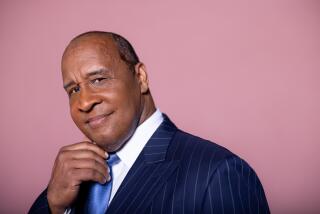Voters Extend Daley’s Reign in Chicago
- Share via
CHICAGO — With little fanfare and less opposition, Mayor Richard M. Daley coasted to his fifth term in office Tuesday, extending a reign during which he has quietly become as powerful as his blustery, more famous father was.
Facing three little-known challengers with few campaign dollars, Daley won the election after running a typically low-key campaign and declining to stump in recent days, after the death of his mother, Eleanor “Sis” Daley, on Feb. 16 and the deaths of 21 people in a nightclub stampede the following day.
With 97% of precincts reporting, Daley had 79% of the vote. His nearest competitor, the Rev. Paul Jakes, had 14%.
Daley will head into his fifth term facing the same recession-based budget problems of most cities, and questions about city oversight of buildings after the disaster at the E2 nightclub, but also with exceptionally high approval ratings and a City Council so compliant that aldermen frequently vote 50 to 0 in support of his initiatives.
“It’s hard to find anybody who doesn’t think he is doing a good job, at the very least, and most think he does a great job,” said Kenneth Janda, a political scientist at Northwestern University. “There just aren’t many people who want to get him out.”
Daley is the son of Richard J. Daley, who ruled Chicago for 21 years, until his death in 1976. The elder Daley was a virtual dictator, historians agree, governing through patronage, bullying and the famous Democratic Machine he helped build to get out the vote and enforce his policies in the city’s 50 wards.
The son has amassed the same kind of overwhelming authority, but he has done so more benignly, observers say. He has molded a friendly council by consulting with aldermen rather than by threatening them, and he has won elections by amassing huge campaign funds rather than by dispatching machine henchmen.
“I call this the New Daley Machine,” said Dick Simpson, a former alderman who battled the elder Daley on numerous issues in the 1970s. “This new machine is funded by the local economy, contributions from bankers, lawyers, business people.”
By his last years in office, the elder Daley had installed 20,000 to 30,000 workers through patronage, said Simpson, a political science professor at the University of Illinois at Chicago. Simpson estimates there are now fewer than 10,000 patronage employees in the city.
“The current mayor supplements the old political machinery,” Simpson said. “He raises millions of dollars per campaign. He hires the best political consultants in the country.”
Daley could not be reached Tuesday for comment. His campaign aides have said his priorities over the next four years will be education, affordable housing, libraries, schools and parks.
Syntactically challenged in the way of his father, often a bit disheveled and occasionally surly in public, Daley also enjoys an odd, unexpected cult of personality. Although he seldom seems comfortable when television cameras are present, Daley has a calming effect when he speaks to his city, whether he’s talking about controversial expansion plans at O’Hare International Airport or the death of a police officer.
Critics, including Jakes, have called his popularity the result of a family dynasty that should have no role in a modern democracy. Supporters are just happy to ride the coattails.
Many aldermen also seeking reelection Tuesday happily campaigned, in a roundabout way, for Daley, paying for banners and placards that read, for example: “Daley, Mayor. Matlak, Alderman.” Daley always got first billing.
Most agree that Daley has done more than retain and increase power since first being elected in 1989 after Mayor Harold Washington died in office.
In 1987, then-Education Secretary William J. Bennett called the Chicago public school system “the worst in the nation.” In 1995, the Illinois Legislature granted Daley control of the schools. He centralized control by naming a chief executive, required more training for teachers and mandated standardized testing of students. Within a few years, President Clinton called the system “the model” for the rest of the country.
Through a series of initiatives, Daley has improved the shoreline of Lake Michigan, has expanded green space, has begun overhauling the troubled Chicago Housing Authority and has launched a massive downtown park and amphitheater project called Millennium Park.
Although the city remains racially divided, Daley has earned such support from African Americans that when Democratic Rep. Bobby L. Rush, who is black, challenged him in 1998, Daley won in a landslide, earning 45% of the black vote.
A “builder-mayor,” as Simpson puts it, rather than a political intellectual, Daley has surprised many by his obsession with Chicago’s physical beauty, its art and its architecture, as much as with the elevated trains running on time.
Under Daley’s rules, if you put in a new sidewalk, you must plant a tree every 15 feet. He has paved the way for dozens of massive downtown reconstruction projects while making it nearly impossible to tinker with the facade of any remotely historic structure.
“Other mayors talk about their football teams and baseball teams, and Mayor Daley talks about what the Monet exhibit did for Chicago,” said Tom Cochran, executive director of the U.S. Conference of Mayors. “Many of these things he does don’t seem exciting. Then they start spreading across the nation. And these are the things that come to define a city.”
More to Read
Sign up for Essential California
The most important California stories and recommendations in your inbox every morning.
You may occasionally receive promotional content from the Los Angeles Times.













